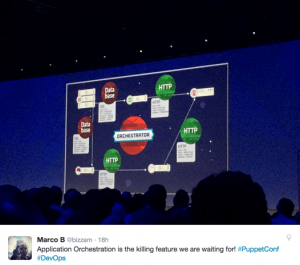We are excited about writing again about the great event that we are attending for the 4th year: the Puppet Conf 2015.
Luke Kanies, Puppet Labs founder & CEO, has started the conference talking about Puppet’s growth:
- Puppet is used in 30.000 companies
- It has 22 new users per day
- 588 modules on forge
- 1000 paying customers using Puppet Enterprise
- the company has now 400 employees
The last 10 years have been exciting, because Puppet has become the market leader..but the roadmap for the next 10 years is going to be much more rising.
The following quote by Luke embodies exactly which is the Puppet aim: "If it had an IP address I would like to manage it”.
Luke then started talking about the software supply chain: he underlined how we all expect software to deliver value through an easy-to-use interface. But this ease of use, he says, “is deceptive” as demonstrated by the increasing levels of complexity. Everything needs to be started, powered off, managed and used. The deployment of today growing services, like EMC, Oracle, IBM, Cisco, VMware ones, are managed by Puppet Enterprise Applications. They must be well managed with balance between creativity and organization. Systems must learn quickly in order to be ready for all new changes. Moreover it’s increasing the importance to reduce the timeline between the adoption of a new technology and its use on production.
Services must also be launched in the correct sequence: and that's where application orchestration come in.
At this point Ryan Coleman went on the stage and gave a demonstration of application orchestration, live and on the Forge, showing how the same model for declaring node configurations is elevated to declaring the state of complex distributed applications.
Then Luke took again the stage to talk about Puppet's approach to release the Application Orchestrator, and its new developments for the future. The orchestrator, is a part unified stack and is going to solve some real problems managing distributed applications, but he says "there's a ton to do on this product". Releasing this product in an early state will give the possibility to get feedback from people who use the orchestrator. Luke confirmed that “users feedbacks are critical to how this product will evolve”.
“Puppet Application Orchestration is a direct extension of our existing strengths and technologies, adding new tools and capabilities that give our customers a full management stack, from bare metal all the way up to modern distributed applications ,” states Luke. “It marks a huge step forward for the industry, and it’s just the beginning of another decade of innovation from Puppet Labs. Because Application Orchestration is built on the core concepts underlying our past 10 years of success, and can use any of the 3,500 public Forge modules, any team using Puppet has an unfair advantage over competitors who can’t deploy as quickly.”
As Puppet Labs argues, most applications now rely on a wide variety of other components and services to run. This additional complexity is making it increasingly harder to IT teams to manage and deploy these applications. As IDC Research VO for Enterprise System Management Software Mary Johnston Turner notes, “IT administration teams spend 40% of their time simply managing new service requests, provisioning systems and applying patches.” Puppet Labs Orchestration aims to cut down this time significantly.
The new service uses the same model-based approach which Puppet users are already familiar with and the service is mostly agnostic to the technologies that admins want to use. This means, users can install their applications on bare metal or containers, on premises, in the cloud or as a hybrid deployment.
Here you can find the list of the new functionalities of Puppet Opensource (integrated in Puppet Enterprise):
- Puppet server 2
backward compatible with Puppet 3 and more 'powerful and fast, with many more features https://docs.puppetlabs.com/puppet/4.2/reference/index.html
- Puppet DB3
A new faster and more complete API, bi-directional replication between different PuppetDB instances that occurs at the application level and not at DB one.
https://docs.puppetlabs.com/puppetdb/3.0/
- Code Manager
Called Direct Puppet, it adds intelligence and predictability to the Puppet Server, it optimizes and controls the workflow for commissioning module production. It’s based on r10k https://github.com/puppetlabs/r10k
Let’s summing up Puppet services in few concepts:
- Composition: core configuration with the capability to focus on a single task.
- Flexibility: the same configuration must work on different hosts and operating systems, it’s reusable and it allows to build a new datacenter from scratch
- Predictability: it has the ability to simulate what should happen
- Orchestration: capability to understand relationships between resources; ability to react to changes, considering configuration files and hosts; to apply huge sets of configuration across the datacenter.
- The orchestrator has the context at low level on each system.
- Application Infrastructure – understanding of dependencies between system and applications (load balancer, middleware, databases, storage) and of shared informations; ability to manage them building associations.
If you don’t have enough, follow our Twitter account for new updates about the conference!
Please find below some interesting links related to the mentioned topics:
- https://puppetlabs.com/introducing-puppet-application-orchestration(Official Press release)
- https://puppetlabs.com/blog/new-standard-orchestrating-distributed-software-applications(Application & Orchestration)
- https://puppetlabs.com/presentations/puppetconf-2015-lukes-keynote-address(Watch the Keynote)




